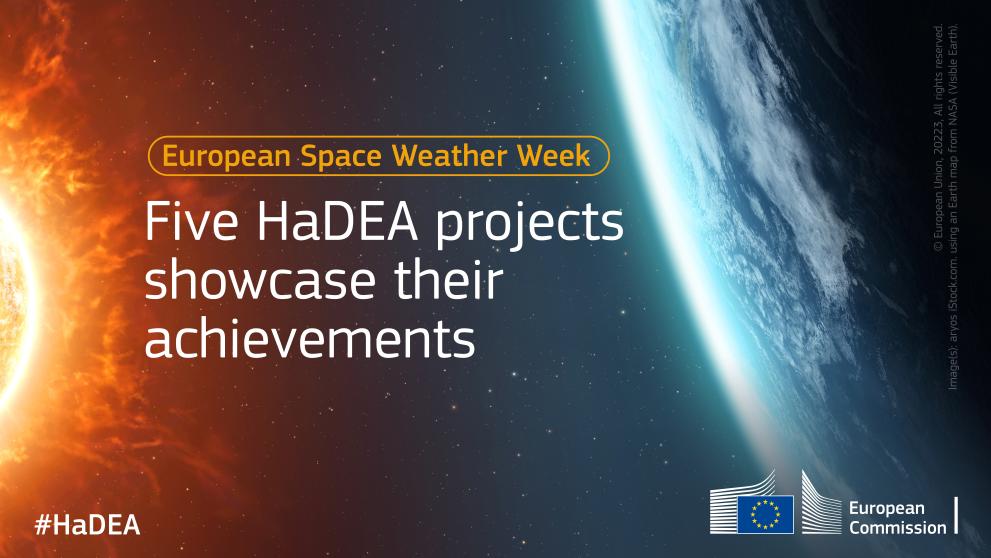
The European Space Weather Week (ESWW) is the main annual conference for the European space weather and space climate community. This year’s edition is centred around the theme ‘Bringing Space Weather, Space Climate and Engineering Together’ and is taking place in Toulouse, France, and online, from 20 to 24 November.
HaDEA is managing a portfolio of space weather research projects. These EU-funded projects enable the development and validation of new models and prediction capabilities for Space Weather Events, such as radiation storms and solar flares.
Discover the five projects presenting their achievements at the ESWW 2023:
T-FORS (Horizon Europe) is developing new models to forecast Travelling Ionospheric Disturbances (TIDs), a specific type of space weather disturbance that disrupts radio-electrical signals.
- The project is organising the T-FORS First Innovation Day (23 November) to present the project concept and discuss stakeholder needs.In addition, Dr. Vincent Fabbro will be representing the project with the poster presentation ‘T-FORS: Travelling Ionospheric Disturbances Forecasting System’.
FARBES (Horizon Europe) aims to provide actionable information on future high-energy electron environments for spacecraft operators. To achieve this, the project implements a series of key innovations and advances in radiation belt prediction.
- Dr. János Lichtenberger will present the project via the poster presentation ‘Forecast of Actionable Radiation Belt Scenarios (FARBES)’.
ARCAFF (Horizon Europe) is developing a state-of-the-art flare forecasting system utilising end-to-end deep learning models to significantly improve upon traditional flare forecasting capabilities.
- Dr. Shane Maloney will represent the project with the poster presentation ‘ARCAFF: Active Region Classification and Detection using Deep Learning’.
PAGER (Horizon 2020) developed a real-time space weather predictive framework for key factors such as solar wind, geomagnetic conditions, and the near-Earth radiation environment.
- Several project representatives will be presenting at sessions ‘Multi-point measurements in space for space weather applications’ (Angélica M. Castillo, 21 November) and ‘Assessment of space weather modelling capabilities’ (Dr. Dedong Wang and Dr. Yuri Shprits, 23 November). Visit them at booth 18.
SafeSpace (Horizon 2020) managed to advance space weather nowcasting and forecasting capabilities by improving radiation belt modelling. Building on the combined use of several well-established space weather models, the project developed a Space Safety Service - a prototype service that has been evaluated in collaboration with space industry stakeholders.
- Dr. Ioannis Daglis will discuss the project outcomes via the poster presentation ‘Prediction accuracy of the outer Van Allen belt dynamics’.
Background
Horizon 2020 (H2020) was the EU’s research and innovation funding programme between 2014 and 2020. Horizon Europe is the current research and innovation programme of the EU for the period 2021-2027. Horizon Europe Cluster 4 – Space is supporting the evolution of the operational EU Space Programme components and fosters the competitiveness of the European space sector.
The space environment at the Sun and around the Earth is subject to natural variations called Space Weather Events (SWE). Such events can significantly affect Earth- and space-based infrastructure by disrupting communication systems and power grids. Therefore, monitoring and predicting such events is vital to mitigate the risks associated with them. SWE is a subcomponent of the Space Situational Awareness (SSA) component of the EU Space Programme.
Relevant links
Details
- Publication date
- 20 November 2023
- Author
- European Health and Digital Executive Agency
- Programme Sector
- Space
- Programme
- Horizon Europe Cluster 4: Space
- Tags
- EU financing
- Event
- Innovation
